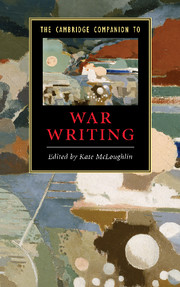Book contents
- Frontmatter
- Introduction
- Part I Themes
- Part II Influences
- Part III Poetics
- 8 Medieval warfare
- 9 Early modern war writing and the British Civil Wars
- 10 The eighteenth century and the romantics on war
- 11 American Revolutionary War writing
- 12 The Victorians and war
- 13 The American Civil War
- 14 The First World War: British writing
- 15 The First World War: American writing
- 16 The Spanish Civil War
- 17 The Second World War: British writing
- 18 The Second World War: American writing
- 19 American writing of the wars in Korea and Vietnam
- 20 The Cold War and the “war on terror”
- Index
12 - The Victorians and war
from Part III - Poetics
Published online by Cambridge University Press: 28 January 2010
- Frontmatter
- Introduction
- Part I Themes
- Part II Influences
- Part III Poetics
- 8 Medieval warfare
- 9 Early modern war writing and the British Civil Wars
- 10 The eighteenth century and the romantics on war
- 11 American Revolutionary War writing
- 12 The Victorians and war
- 13 The American Civil War
- 14 The First World War: British writing
- 15 The First World War: American writing
- 16 The Spanish Civil War
- 17 The Second World War: British writing
- 18 The Second World War: American writing
- 19 American writing of the wars in Korea and Vietnam
- 20 The Cold War and the “war on terror”
- Index
Summary
Introduction
Victory in the Battle of Waterloo (1815), the culmination of the wars against Napoleonic France (1803-15), bequeathed essential stability to Victorian Britain. Though fears of internal social upheaval replaced fears of invasion, Britain now had the freedom and naval preeminence to develop her vast empire. The combination of imperial expansion and ever-improving communications technology (electrical telegraphy was available at the start of the century, wireless telegraphy by the end) meant that war became at once very close to and very far away from the British public. Literature could respond to newspaper headlines (Tennyson's “The Charge of the Light Brigade” [1854] was written moments after the poet had read a report by William Howard Russell in the London Times from the Crimea) and there was wider public familiarity, and empathy, with the lot of soldiers. At the same time, the reduced threat of invasion and the ending of the practice of press-ganging after Waterloo diminished the personal relevance of war in many Britons' lives.
“There is no great art possible to a nation but that which is based on battle,” John Ruskin told an audience of soldiers at the Royal Military Academy, Woolwich, in a lecture delivered in 1865. Victorian war literature is generically varied, ranging from adventure stories to poetry to historical novels to works for children.
- Type
- Chapter
- Information
- The Cambridge Companion to War Writing , pp. 135 - 147Publisher: Cambridge University PressPrint publication year: 2009

